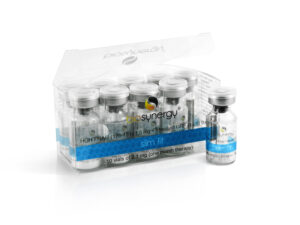Delta Sleep Inducing Peptide (DSIP) is a nonapeptide found in rabbits that has been shown to promote sleep in various species. Despite its sleep-inducing properties, the exact mechanism of how DSIP works and its origin remain unknown even after several decades since its discovery.
No significant side-effects have so far been reported with DSIP. In some human studies, transient headache, nausea and vertigo have been reported.
Sleep-promoting effects occurred only in the second hour after injection, in the first hour a slight arousing effect was indicated. The study corroborates the findings of previous investigations in healthy subjects and shows that DSIP has a normalizing influence on human sleep regulation.
An effective dose of DSIP for treating insomnia is 25-30 nmol/kg b.w., typically injected intravenously over 4-5 min and at least 1 h before bedtime. With repeated injections on successive days, a buildup of the positive effects can be expected.
Delta sleep – In the deepest level of sleep, stage IV sleep, the predominant EEG activity consists of low frequency (1–4 Hz), high-amplitude fluctuations called delta waves, the characteristic slow waves for which this phase of sleep is named. The entire sequence from drowsiness to deep stage IV sleep usually takes about an hour.
How much deep sleep do you need a night – Most healthy adults need around 1 to 2 hours of deep sleep per night, which typically accounts for 15-25% of their total sleep time. This can vary slightly depending on age and individual needs, but this general range provides a good target for optimizing sleep.
what is DSIP made of – The peptide sequence for DSIP is Trp-Ala-Gly-Gly-Asp-Ala-Ser-Gly-Glu, found only in rabbit. While the isolated peptide and synthetic variants have been found to promote sleep in multiple species, it has not led to a deeper understanding of sleep mechanisms (Graf & Kastin, 1984; Krueger & Karnovsky, 1995).
Half life of DSIP – In another study Delta sleep-inducing peptide stimulated Acetyltransferase activity through α1 receptors in rats. It is unknown where DSIP is synthesized. In vitro it has been found to have a low molecular stability with a half life of only 15 minutes due to the action of a specific aminopeptidase-like enzyme.












